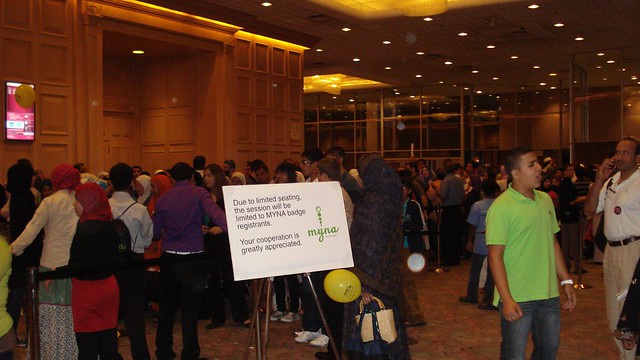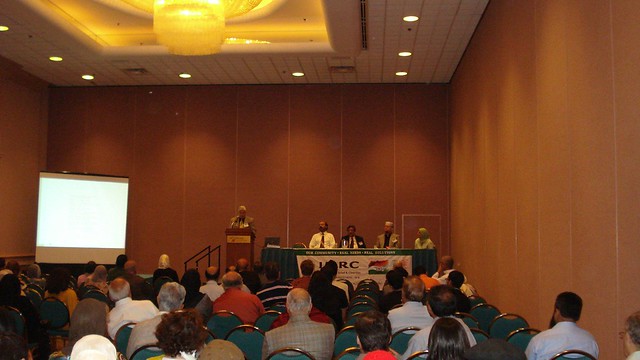by Ayub Khan for TwoCircles.net
Chicago, IL: Speakers at the largest continental Islamic conference here emphasized compassion and mercy as the hallmark of the faith and urged American Muslims to play a leading role in promoting these noble values. The theme for the Islamic Society of North America (ISNA)’s convention was ‘Nurturing Compassionate Communities.’ Held at the familiar Rosemont Convention Center, near Chicago, from July 2-5, 2010 it attracted thousands of Muslims from across the country.

Among the host of keynote speakers who attended the convention was Tariq Ramadan whose ban from the US was lifted earlier this year. He called on the Muslims to be proactive and engaged with wider civil society while holding on to their faith. ‘I prefer never to be allowed here than to be quiet about the Palestinian issue.’
Emphasizing education as the ‘very essence of the faith’ he said that Muslims should be actively engaged in the yearning for truth. He asked them to rise above differences and have critical respect towards each other in their quest. The much needed unity of the community shouldn’t degenerate into uniformity, he added.
Dr. Ingrid Mattson, president of ISNA, speaking on similar lines said that the Muslim community should be organized but not as a cult. There is a wide scope for diversity within the Islamic framework and we should respect that, she said. She praised President Barack Obama for taking initiatives in engaging the Muslim world but was quick to caution that still a lot needs to be done. She urged the Obama to speed up the initiatives he has undertaken.
Rashad Hussain, Obama’s special envoy to the Organization of Islamic Conference, conveyed the greetings of the president to the convention. Presenting an overview of the Obama administration’s efforts towards the Muslim world he said that there has been unprecedented interaction with the global Muslim communities. He said that change is occurring and for the better in the relationship between the two. Calling this initiative as the beginning a new era he said that engagement is comprehensive and has to be continuing.
Responding to those who cast aspersions on Obama’s sincerity he listed a host of initiatives which have been benefiting the Muslims. He especially highlighted the polio eradication efforts which significantly affects the Muslim communities. ‘How is polio eradication efforts, saving lives, not a positive change?’ he asked.

He strongly condemned the acts of terrorists who misuse the name of Islam. Mentioning the recent terrorist attack on a sufi shrine in Lahore he said, “That a Muslim is going into a masjid [mosque] in Pakistan and killing so many other Muslims, that 80 to 90 percent of the people that are victims of violent extremism are Muslims. ..Why is it? If there is a complaint against the foreign policy of this country, why are they killing Muslims? Is that the answer to that grievance or any other grievance? The fact of the matter is there is absolutely no justification whatsoever for killing innocent people. That’s clear in our faith. And if someone has done something wrong to you, to go out and indiscriminately kill someone who had nothing to do with that action must be wholeheartedly rejected.’
Dr. Maher Hathout, leading American Muslim thinker, said that the major danger faced by Muslims everywhere is the danger of irrelevance. Calling for a paradigm shift he called on the American Muslims to lead the way in the meeting this challenge. Rejecting the view that the doors of ijtihad are closed he said that it is required to meet the challenges of a changing world.
Dr. Zahid Bukhari, president of the Islamic Circle of North America, in his remarks said that there are primarily six Muslim cultural zones: a. Arab b.sub-Saharan c. Turk d. Persian e. South Asian f. Malay. The still emerging Western Muslim cultural zone is unique in the sense that it is an amalgamation of the previous six. He said this gives them with the opportunity to combine the best of all the cultures and offer a new dynamic for change. He called on the Muslim community to become the instrument to revive spirituality in an increasingly despiritualized world.
Renowned academic Dr. Ali Mazrui emphasized the need for constant efforts for improvement in the human condition. He called for a re-imagination of dominant modes of governance like democracy. ‘Democracy is the not the last form of governance of human imagination,’ he said. He called on the Muslim world to imagine a new post-democratic system of governance which is more just and fair. He said this can only be done with its readiness to learn from other civilizations and cultures. He said that the Muslim decline began only when it stopped borrowing the good from others.
[Photos : Ayub Khan]

